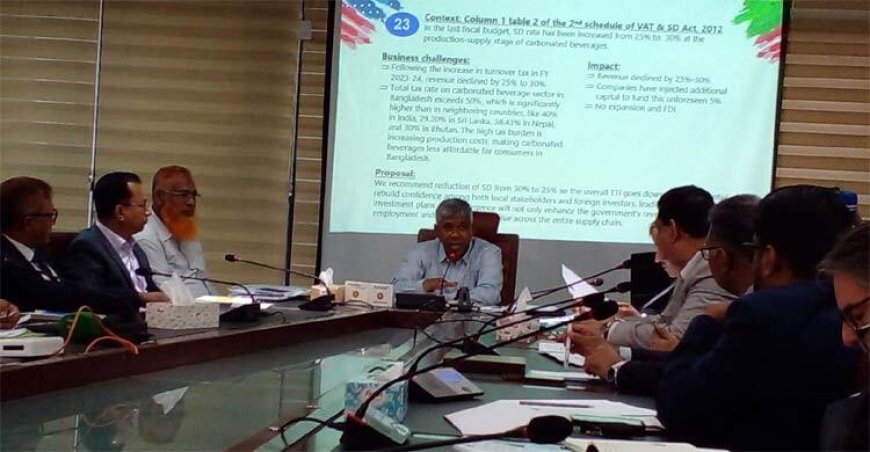AmCham Calls for Removal of Mandatory Tax Return Proof for Credit Card Issuance

সিনিয়র স্টাফ করেসপন্ডেন্ট ২৪ সেপ্টেম্বর, ২০২৫
স্টাফ করেসপন্ডেন্ট ২৩ সেপ্টেম্বর, ২০২৫

The American Chamber of Commerce in Bangladesh (AmCham) has called for the removal of the tax return submission requirement for credit card issuance up to BDT 500,000, citing inconsistencies in the existing policy. While personal bank loans up to this amount do not require tax return submission, credit cards—essentially a form of loan—mandate this documentation.
During a pre-budget discussion at the National Board of Revenue (NBR) office in Agargaon on Wednesday, AmCham leaders argued that easing this restriction would increase credit card usage and strengthen financial transaction tracking, ultimately boosting revenue. Leading the AmCham delegation, Syed Mohammad Kamal, Country Manager of Mastercard, stated, “If the mandatory tax return submission requirement for credit card issuance up to BDT 500,000 is lifted, card usage will increase, and financial transaction identification will be strengthened, which will, in turn, enhance revenue collection.”
In its budget proposal, AmCham recommended reducing the corporate tax rate for the financial and insurance sector from 40% to 30%. Additionally, it urged the withdrawal of corporate taxes on provident and gratuity funds and proposed reducing corporate tax for the logistics and supply chain management sector to 25%.
Reza-Ur Rahman Mahmud, Managing Director of Philip Morris Bangladesh, presented the budget proposals on behalf of AmCham. He highlighted that Bangladesh imposes a 40% tax on offshore banking services, similar to onshore banking, whereas other Asia-Pacific countries levy offshore banking unit (OBU) taxes ranging between 0% and 20%.
Syed Mohammad Kamal emphasized, “OBUs primarily support exporters and create a competitive environment. Introducing a lower tax rate for OBUs would allow local banks to offer competitive financing to foreign investors, benefiting exporters.”
AmCham also pointed out that cash transactions still dominate Bangladesh’s economy, while digital payments are subject to additional VAT and taxes. Unlike many other nations, Bangladesh has yet to introduce effective incentives for digital payments. To address this, AmCham proposed a 5% incentive for digital transactions—3% for consumers and 2% for businesses.
Syed Mohammad Kamal noted, “Encouraging digital payments will enhance transaction transparency, reduce tax evasion, and strengthen financial sector oversight.”
Reza-Ur Rahman Mahmud further recommended replacing the tax return submission proof (PSR) requirement for credit cards with only a mandatory Taxpayer Identification Number (TIN). He also suggested reducing the supplementary duty (SD) on carbonated beverages and lowering VAT rates on medical devices and technology.
The pre-budget discussion was part of NBR’s consultation process for drafting tax proposals for the 2025-26 fiscal year. Representatives from over ten business organizations and government agencies, including Business Initiative Leading Development (BUILD), the High-Tech Park Authority, the India-Bangladesh Chamber, the Women’s Chamber, and the Bangladesh Economic Zones Authority (BEZA), participated. The Women Entrepreneurs Network for Development Association proposed raising the tax-free income threshold for female entrepreneurs from BDT 400,000 to BDT 500,000.
In his concluding remarks, NBR Chairman Abdur Rahman Khan stated that the upcoming budget would increase tax burdens on sectors currently paying lower tax rates. He asserted, “NBR provides tax exemptions equivalent to the total tax collected. We aim to move away from this exemption culture. Our target is to reassess the justification for tax exemptions in long-standing sectors. Pressure is mounting on NBR regarding this issue. Some exemptions have already been reduced, and more will be withdrawn in the next budget.”
He further emphasized that Bangladesh’s tax policy must be equitable, saying, “There should be no tax discrimination in a fair society. It is unacceptable for some businesses to pay the highest tax rates while others benefit from reduced rates. If a sector requires tax exemptions, they should be granted for a fixed period, not indefinitely. The upcoming budget will reflect efforts to reduce tax disparities.”
সালেহ মোবিন ২৮ অক্টোবর, ২০২৫
তানভীর হাসান জোহা ১৯ অক্টোবর, ২০২৫
মোঃ মনিরুজ্জামান ৯ অক্টোবর, ২০২৫
মোহিব্বুল মোক্তাদীর তানিম ২০ সেপ্টেম্বর, ২০২৫
আন্তর্জাতিক ডেস্ক ৩০ অক্টোবর, ২০২৫
আন্তর্জাতিক ডেস্ক ৩০ অক্টোবর, ২০২৫
আন্তর্জাতিক ডেস্ক ৩০ অক্টোবর, ২০২৫
আন্তর্জাতিক ডেস্ক ২৯ অক্টোবর, ২০২৫
Total Vote: 7
ভালো
Total Vote: 51
যৌক্তিক
Total Vote: 54
একমত




